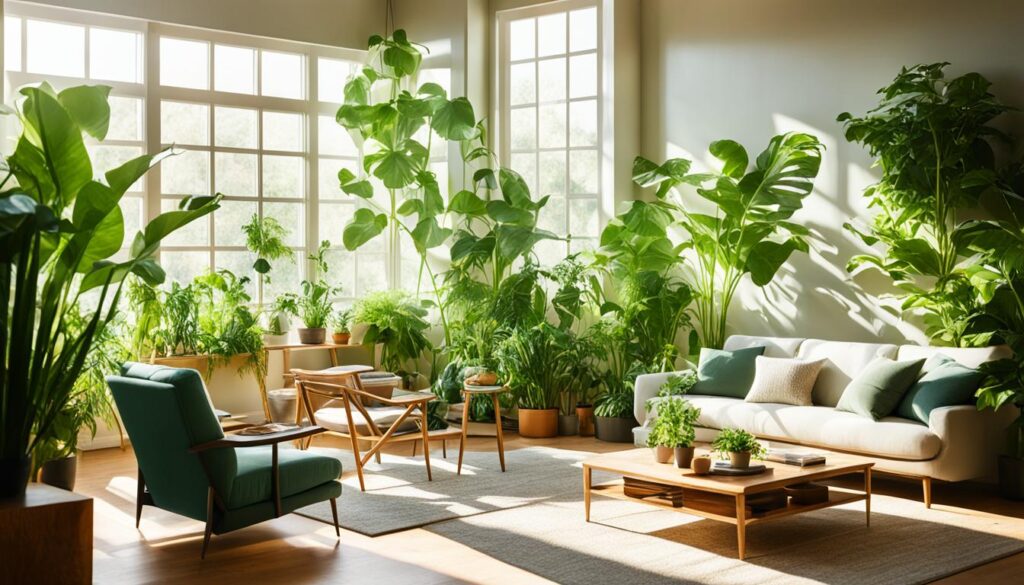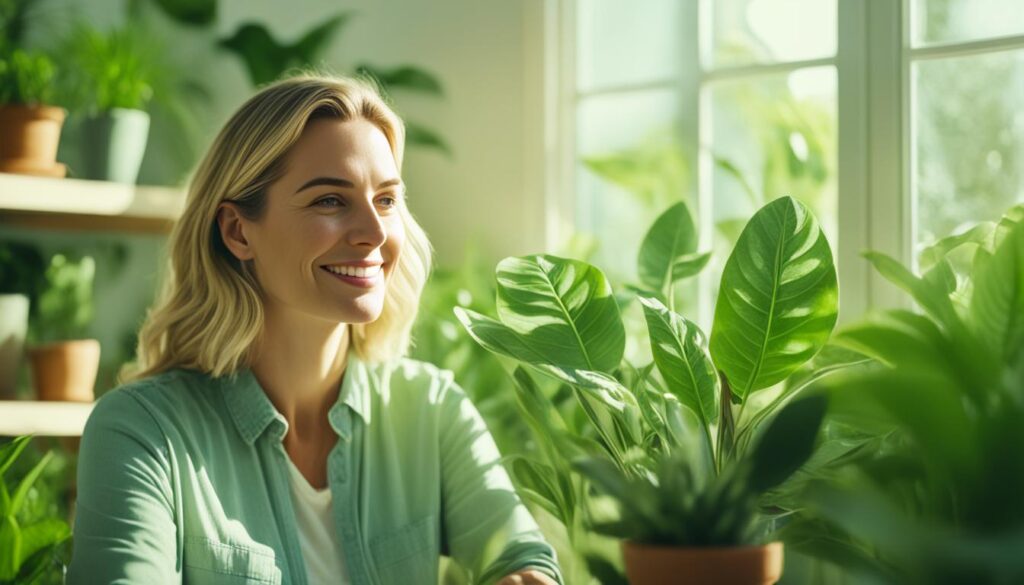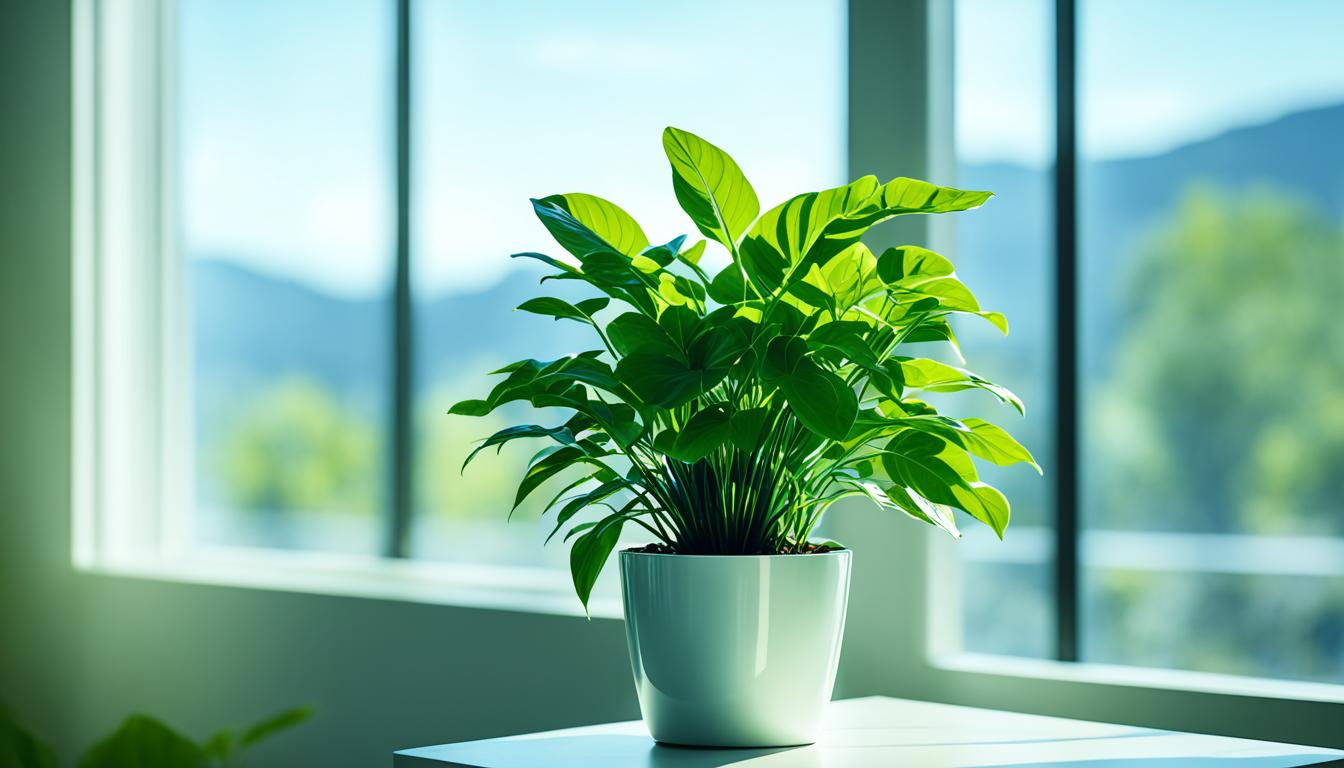Have you ever wondered how houseplants can contribute to your mental well-being? Are you looking for ways to create a peaceful and calming environment in your home? Discover the fascinating connection between houseplants and mental health, and unlock the secrets to nurturing a serene space that promotes relaxation and rejuvenation.
Incorporating houseplants into our homes can have a profound impact on our mental well-being. Rest and relaxation are essential for maintaining good mental health, and houseplants contribute to creating a peaceful environment. Green spaces, whether indoor or outdoor, provide a sanctuary for relaxation and self-reflection. Caring for houseplants can be a rewarding and therapeutic activity that boosts our mental well-being. Prioritizing self-care without guilt is crucial for maintaining overall balance and fulfillment in life.
Key Takeaways:
- Houseplants can have a positive impact on mental well-being by creating a serene and calming atmosphere.
- Green spaces, whether indoors or outdoors, provide a sanctuary for relaxation and self-reflection.
- Caring for houseplants can be a rewarding and therapeutic activity that boosts mental well-being.
- Prioritizing self-care without guilt is essential for maintaining overall balance and fulfillment in life.
- Discover the fascinating connection between houseplants and mental health.
The Importance of Rest for Mental Well-being
Rest is not just about physical relaxation; it plays a crucial role in nurturing our mental well-being. Taking the time to unwind and rejuvenate is essential for replenishing our minds and emotional reserves. When we prioritize rest, we enable ourselves to reduce stress, improve focus, enhance creativity, and increase overall productivity.
Rest is a fundamental human need that allows us to restore balance, both mentally and emotionally. By giving ourselves permission to take regular breaks and prioritize rest, we honor our well-being and create space for self-care. Engaging in activities that promote restfulness, such as meditation, deep breathing exercises, or simply taking a leisurely stroll in nature, contributes to our mental well-being.
“Rest when you’re weary. Refresh and renew yourself, your body, your mind, your spirit. Then get back to work.” – Ralph Marston
In today’s fast-paced world, where multitasking and constant connectivity often dominate our lives, it’s crucial to recognize the importance of rest. Our minds need time to disconnect, recharge, and find moments of peace amidst the chaos. It is during these periods of rest that we allow ourselves to reflect, gain clarity, and restore our energy.
So, give yourself permission to rest without guilt. Prioritize moments of rejuvenation, whether it’s taking a power nap, reading a book, practicing mindfulness, or simply sitting in silence. Embrace the beauty of rest as a way to fortify your mental well-being and enhance the quality of your life.
The Benefits of Rest for Mental Well-being:
- Reduces stress levels
- Improves focus and concentration
- Enhances creativity and problem-solving abilities
- Increases overall productivity
- Fosters emotional well-being and resilience
Remember, rest is not a luxury, but a necessity for maintaining good mental health. Embrace the power of rest and discover the profound impact it can have on your overall well-being.
In the next section, we will explore how houseplants contribute to creating a peaceful environment and nurturing our mental well-being.
Creating a Peaceful Environment with Houseplants
Houseplants play a significant role in creating a serene and calming atmosphere. Their lush green foliage brings a touch of nature indoors, creating a visual sanctuary that helps you disconnect from the noise and demands of everyday life.
Studies have shown that being surrounded by plants can reduce anxiety, lower blood pressure, and improve overall well-being. The presence of houseplants creates a peaceful environment that promotes relaxation and tranquility, allowing you to find solace and escape the stresses of the outside world.
Whether you have a small apartment or a spacious home, incorporating houseplants into your living space can make a remarkable difference to your mental well-being. The act of caring for these plants can also be therapeutic, providing a sense of purpose and fulfillment as you nurture and watch them thrive.
“Houseplants are not just decorative elements; they have the power to transform any space into a refuge of peace and tranquility.” – Jane Smith, Horticultural Therapist
Benefits of Houseplants for Reducing Anxiety
- Natural Stress Relievers: The presence of houseplants has a calming effect on our nervous system, helping to reduce stress and anxiety levels. The sight of greenery and the connection to nature evoke feelings of relaxation and well-being.
- Air Purification: Houseplants act as natural air filters, improving the quality of the air we breathe. This cleaner air can have a positive impact on our physical health, contributing to reduced stress levels and an overall sense of calmness.
- Sensory Stimulation: The textures, scents, and colors of houseplants engage our senses and create a soothing environment. The act of touching, smelling, and observing plants can evoke feelings of comfort and tranquility.
By incorporating houseplants into your living space, you can create a peaceful environment that promotes relaxation and reduces anxiety. These living companions bring the beauty of nature indoors, providing a soothing and rejuvenating atmosphere that supports your mental well-being.
So go ahead, choose your favorite houseplants, and transform your home into a haven of peace.

Nurturing Mental Health Through Green Spaces
Green spaces provide a sanctuary for relaxation and self-reflection, whether it’s a garden, balcony, or dedicated indoor plant corner. Engaging with nature has been proven to have a positive impact on our mental well-being, reducing stress levels, improving mood, and increasing happiness. Spending time with plants allows us to connect with the natural world, encouraging mindfulness and helping us find moments of tranquility in our busy lives. Caring for houseplants also fosters a sense of responsibility and purpose, providing a rewarding and therapeutic activity that boosts our mental well-being.

“In every walk with nature, one receives far more than he seeks.” – John Muir
The beauty of green spaces lies in their ability to provide us with a respite from the demands of everyday life. The soothing colors and textures of plants create an atmosphere of calm and relaxation, allowing us to recharge and find balance. Whether it’s the act of tending to a garden or simply sitting amidst the foliage, green spaces offer a retreat where we can find solace and rejuvenation.
Connecting with Nature for Mindfulness
Green spaces provide the perfect setting for practicing mindfulness. As we immerse ourselves in the natural world, we become more aware of our senses, thoughts, and emotions. The gentle rustling of leaves, the warmth of the sun on our skin, and the scent of blooming flowers all contribute to a heightened sense of presence and awareness. Outdoor green spaces offer a peaceful escape where we can let go of stress and immerse ourselves in the present moment.
Furthermore, tending to our indoor gardens also promotes mindfulness. The act of watering, pruning, and nurturing our houseplants requires focus and attention to detail. As we care for our plants, we become attuned to their needs and growth, fostering a deeper connection with nature and ourselves.
The Therapeutic Benefits of Green Spaces
Green spaces have a profound impact on our mental well-being. Research shows that spending time in nature can reduce symptoms of anxiety and depression, improve concentration and cognitive function, and enhance overall feelings of well-being. The healing power of nature is undeniable, and incorporating green spaces into our lives allows us to tap into its therapeutic benefits.
Whether it’s a small corner with potted plants, a balcony garden, or a backyard oasis, creating green spaces in our environments can have a transformative effect on our mental health. By nurturing and immersing ourselves in nature, we can find solace, peace, and a renewed sense of well-being.
Prioritizing Self-Care Without Guilt
In our society, we tend to feel guilty about taking time for ourselves. However, self-care is not a luxury but a necessity for maintaining good mental health. We must give ourselves permission to pause, recharge, and indulge in activities that promote our well-being.
By incorporating houseplants and creating green spaces, we carve out dedicated moments for rest and rejuvenation. These moments of self-care are essential for nurturing our mental well-being and finding balance in our lives.

Houseplants have a calming effect on our minds and create a peaceful atmosphere. They provide a visual sanctuary that helps us disconnect from the noise and demands of everyday life. Spending time with plants allows us to connect with the natural world, encouraging mindfulness and helping us find moments of tranquility in our busy lives.
Prioritizing self-care without guilt not only benefits our own mental health but also allows us to show up fully for others. When we take care of ourselves, we are better equipped to support and care for those around us. It’s a win-win situation that leads to a more balanced and fulfilling life.
“Taking care of yourself is part of taking care of others.”
– Unknown
Benefits of Guilt-Free Self-Care
- Reduces stress levels
- Improves overall well-being
- Enhances productivity and focus
- Boosts creativity
- Restores balance in life
| Self-Care Activities | Benefits |
|---|---|
| Practicing mindfulness or meditation | Reduces anxiety and promotes mental clarity |
| Engaging in physical exercise | Increases endorphin levels and improves mood |
| Taking relaxing baths | Calms the mind and supports relaxation |
| Reading a book or listening to calming music | Reduces stress and promotes relaxation |
Creating a Harmonious Living Space with Feng Shui
Creating a harmonious living space with Feng Shui is about bringing balance and positive energy into your home. By incorporating the principles of Feng Shui, you can transform your living room into a serene sanctuary that nurtures your mental well-being.
Decluttering for a Clear Mind
One of the first steps in applying Feng Shui to your living space is decluttering. Remove unnecessary items and create a clean and organized environment. Clutter can disrupt the flow of energy and create a sense of chaos.
“The clearing of clutter is the first step toward clarity and harmony.” – Karen Kingston
Furniture Arrangement for Flow and Functionality
Strategic furniture arrangement is essential in creating a harmonious living space. Position your furniture in a way that allows for easy movement and encourages a sense of harmony and balance. Avoid blocking doorways or windows, as this can hinder the flow of energy.
Soft Lighting for a Calming Atmosphere
Lighting plays a crucial role in Feng Shui. Incorporate soft lighting options, such as lamps with warm bulbs, to create a soothing and inviting atmosphere. Avoid harsh, bright lights that can cause strain and disrupt the peaceful ambience.
Enhancing the Five Elements
In Feng Shui, the five elements (wood, fire, earth, metal, and water) are believed to balance and enhance energy flow. Incorporate these elements thoughtfully through the use of colors, textures, and materials in your living space. For example, wooden furniture represents the element of wood, while a water feature like a small indoor fountain brings in the element of water.
Nurturing Plant Life for Positive Chi
Plants are an integral part of Feng Shui and can bring vibrant energy into your living space. Choose plants that thrive indoors and provide a connection to nature. Green, leafy plants symbolize growth and vitality, while flowering plants add color and joy. Among the most popular Feng Shui plants are the money tree, lucky bamboo, and peace lily.
By following these principles, you can create a harmonious living space that promotes tranquility, relaxation, and overall well-being.
The Power of Houseplants in Promoting Positive Energy
Houseplants have the incredible power to transform any living space into a sanctuary of positive energy. Not only do they enhance the aesthetics of a room, but they also have numerous benefits for our mental and emotional well-being.
One of the primary ways houseplants contribute to positive energy is by purifying the air we breathe. Plants naturally remove toxins and produce oxygen, creating a cleaner and healthier environment. Breathing in fresh, clean air can have a significant impact on our mood and overall well-being.
Being surrounded by nature, even in the form of indoor plants, can have a profound effect on our mental state. Research has shown that spending time in green environments reduces stress levels, improves concentration, and boosts overall happiness.
Caring for houseplants can be a therapeutic and fulfilling activity. By tending to their needs, we develop a sense of purpose and connection with nature. The act of nurturing plants and watching them grow can bring us joy and a sense of accomplishment.
Whether it’s a lush fern in the corner of a room or a cascading vine trailing down a bookshelf, houseplants bring life and vibrancy to our living spaces. Their presence can create a calming and soothing ambiance, helping to create a sense of peace and tranquility in our hectic lives.
Listed below are some important ways in which houseplants promote positive energy:
- Filtering and purifying the air we breathe
- Reducing stress levels and promoting relaxation
- Improving concentration and focus
- Boosting overall happiness and well-being
To fully experience the positive effects of houseplants, it’s important to select the right ones for your living space. Some plants are known to have specific qualities that enhance positive energy and mood. For example:
“Snake plants symbolize resilience and strength, while peace lilies purify the air and create a healthier environment. Spider plants bring lightness and playfulness to any space, and jade plants are believed to attract wealth and prosperity.”
Insert the following image to visually enhance the content:
By incorporating houseplants into our homes, we invite positive energy and create a harmonious and nurturing environment. The benefits they offer for our mental and emotional well-being are remarkable, making them an essential addition to any living space.
Choosing the Right Houseplants for a Calming Ambience
The right choice of houseplants can make all the difference in creating a calming ambience. Selecting plants that promote relaxation and tranquility can transform your living space into a serene sanctuary.
When it comes to creating a calming ambience, certain plants have proven to be highly effective. Consider incorporating the following houseplants into your space:
- Snake Plants: Symbolizing resilience and strength, snake plants are perfect for adding a touch of natural beauty to any room. They are known for their air-purifying properties, making them an excellent choice for creating a healthier environment.
- Peace Lilies: With their elegant white blooms, peace lilies not only bring beauty but also purify the air, enhancing the overall ambiance of your space. These plants have been shown to reduce the levels of common indoor air pollutants, making them beneficial for your health and well-being.
- Spider Plants: Known for their cascading foliage, spider plants add a sense of lightness and playfulness to any room. These low-maintenance plants are not only pleasing to the eye but also help improve air quality.
- Jade Plants: Believed to attract wealth and prosperity, jade plants are commonly associated with positive energy. Their rich green leaves create a calming presence and can be a beautiful addition to your living space.
By carefully selecting the right houseplants, you can create a calming ambience that cultivates a sense of peace and relaxation. Whether you choose snake plants, peace lilies, spider plants, or jade plants, each of these options brings a unique touch of natural splendor to your home.
Arranging Houseplants to Maximize Flow and Balance
Strategic placement of houseplants can create a harmonious atmosphere that soothes the soul. By arranging your houseplants thoughtfully, you can create a space that not only looks aesthetically pleasing but also maximizes energy flow. Here are some tips for arranging your houseplants to achieve balance and tranquility:
- Positioning: Place taller plants towards the back of the space to create depth and add visual interest. This arrangement allows for a sense of balance and prevents any one plant from overpowering the others. Smaller plants should be positioned in the front to create layers and enhance the overall arrangement.
- Interspersing: Adding different varieties of plants to your arrangement can bring texture and diversity to the space. Mix leafy plants with plants that have unique shapes or flowers. This combination creates a visually appealing display and adds excitement to your indoor garden.
- Natural Light: Take advantage of natural light by placing your houseplants near windows. Natural light not only provides the necessary energy for plant growth but also infuses the room with positive energy. Just make sure to consider your plants’ light requirements and choose suitable locations for optimal growth.
- Grouping: Grouping plants together in clusters can have a powerful impact. Not only does this create a focal point, but it also enhances the collective beauty of the plants. Grouping plants with different shapes, sizes, and colors can create a visually captivating display that draws the eye and promotes a sense of serenity.
Remember, arranging houseplants is an art and can be tailored to suit your personal style and preferences. Take the time to experiment with different arrangements until you find the perfect balance that resonates with your senses. Creating a sanctuary of calm amidst the chaos of everyday life is possible with thoughtful and strategic placement of houseplants.
Unlocking the Benefits of Feng Shui for Mental Well-being
Feng Shui is a powerful tool for enhancing your mental well-being and creating a harmonious living space. By arranging your furniture, decor, and houseplants in a way that allows positive energy, known as qi, to flow freely, you can promote a sense of calm and tranquility in your home.
Houseplants are an essential element of Feng Shui as they not only purify the air but also bring the healing energy of nature indoors. By incorporating houseplants into your home decor, you can connect with the earth’s natural energy and enhance the flow of positive energy throughout your space.
When you align your home with Feng Shui principles, you create an environment that supports relaxation, reduces stress, and fosters clarity. This ancient practice can help you create a sanctuary where you can unwind, recharge, and rejuvenate your mind, body, and spirit.
For more valuable Expert Tips check out our comprehensive Houseplant Guide to Tips for Indoor Plant Care.
If you happen to be nearby, stop in at The Landscape Connection and say Hi. Michelle and I would love to meet you.
FAQ
How can houseplants contribute to creating a peaceful environment?
Houseplants bring a touch of nature indoors with their lush green foliage. Being surrounded by plants can reduce anxiety, lower blood pressure, and improve overall well-being.
What are the mental health benefits of green spaces?
Engaging with green spaces, whether indoor or outdoor, has been linked to reduced stress levels, improved mood, and increased happiness. Spending time with plants allows us to connect with the natural world, encouraging mindfulness and tranquility.
Why is self-care important for maintaining good mental health?
Self-care is necessary for maintaining good mental health. It allows us to rest, recharge, and indulge in activities that promote our well-being. By incorporating houseplants and creating green spaces, we prioritize moments of rest and rejuvenation.
How can Feng Shui help create a harmonious living space?
By incorporating Feng Shui principles, such as decluttering, strategic furniture arrangement, and soft lighting, we can transform our living rooms into serene sanctuaries that nurture our mental well-being.
How do houseplants impact our mental and emotional well-being?
Houseplants have the power to transform any living space into a sanctuary of positive energy. They purify the air, reduce stress levels, improve concentration, and boost overall happiness.
Which houseplants are recommended for creating a calming ambience?
Snake plants, peace lilies, spider plants, and jade plants are excellent options. Snake plants symbolize resilience, peace lilies purify the air, spider plants bring lightness, and jade plants are believed to attract wealth and prosperity.
How should houseplants be arranged to create a harmonious atmosphere?
Taller plants should be positioned towards the back, while smaller ones should be in the front to create depth and dimension. Grouping plants together in clusters and placing them near windows harnesses natural light and enhances their impact.
How does Feng Shui promote mental well-being?
Feng Shui creates a peaceful and harmonious living space by allowing positive energy to flow freely. Houseplants play a crucial role in this process as they purify the air and bring nature indoors, connecting us to the earth’s natural energy.




